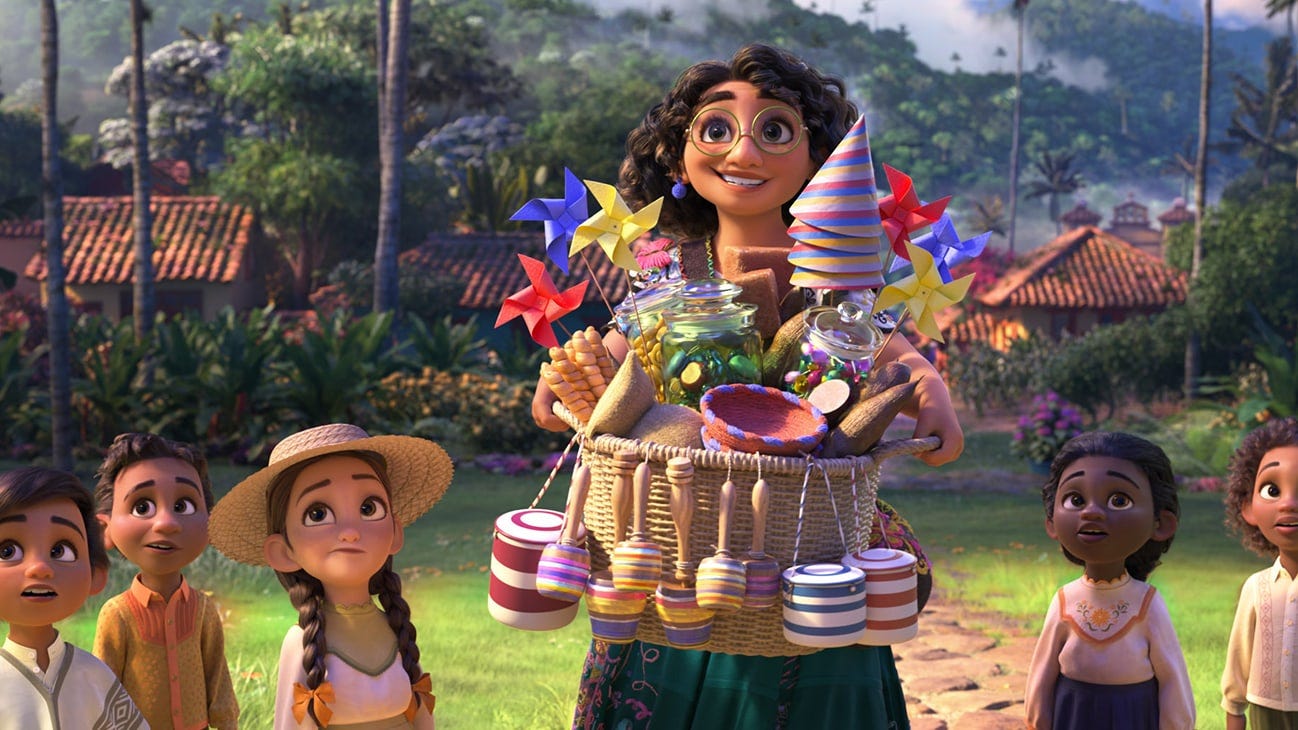A Small Town Likes Its Privacy, Thank You Very Much
Advanced reflections on Disney's 'Encanto.' Plus: 'Pete the Cat' noted.
Current Cinema: The only new series targeted at children and/or teenagers that I've had time to sample lately is Pete the Cat on Amazon Prime Video -- not to be confused with Mayor Pete, a documentary about the politician, also now streaming on Amazon Prime Video -- and while I've enjoyed the refreshingly minimal backgrounds, pleasant interactions between the animal characters, and the music and voices of Elvis Costello and Diana Krall as Pete's parents, it's not necessarily a show that single adults might especially enjoy as anything more than a break from the usual-usual noise. (That's not a bad thing in itself, of course.)
Last week I covered Clifford the Big Red Dog and Home Sweet Home Alone; while both are available on streaming services -- Paramount Plus and Disney Plus, respectively -- only Clifford the Big Red Dog also opened in theaters, where it did pretty well; it's made $24 million worldwide so far, per Box Office Mojo, against an estimated budget of $64 million (per Forbes). A far biggest financial investment, I would imagine, has been made by Disney with Encanto, which features the studio's usual lush backgrounds, a plethora of distinct Latinx characters, and a storyline that is driven with an eye to enchant audiences of all ages, as I wrote in my review at Screen Anarchy.
What I've thought about since my review was published is what the film's release suggests about future release plans by Disney and its corporate sisters, including Pixar and 20th Century Studios, the latter of which was responsible for Home Sweet Home Alone, as well as the upcoming Diary of a Wimpy Kid. It seems that 20th Century Studios will not be primarily targeting the family audience in the future with all of their future releases; whatever course they follow, they will likely target the young adult (and older) market, leaving Disney and Pixar to the even younger market, namely, children and teenagers (and their parents and/or adult guardians).
As a longtime fan of animation, it seems to me that Pixar is aiming at the teenage audience. Both of their releases scheduled for next year, coming-of-age story Turning Red and sci-fi origin story Lightyear, confirm their immediate intent, which follows this year's coming-of-age fish-monster story Luca and last year's releases, the coming-of-age story Onward and the religious allegory Soul, which preached its spiritual philosophy in the guise of a family film.
On the other hand, Disney Animation has aimed for a wider, more diverse audience, as evidenced in Raya and the Last Dragon earlier this year, and the aforementioned Encanto. One year from now, the studio is planning to release Searcher Clade, which follows an early teenager who is biracial (African-American and Caucasion); the script is written by Qui Nguyen, who wrote Raya.
Meanwhile, Encanto follows a familiar pattern -- an ordinary young person seeks her own identify in a family that is super-talented -- and freshens it up with its setting in Colombia (though the town is hidden in the world) and family connections that are recognizable to anyone who identifies as Latinx or has any knowledge of the traditional Latinx family power structure, which is typically warm, supportive, and just a bit invasive.
It is also an implicit reflection upon superheroes, especially those who reside in the Marvel Cinematic Universe. This is gently done, with love, yet the implications of the troubles that are caused for those who are not superpowered are abundantly clear. (We know you're special; no need to constantly remind us.) In the creation of lead character Mirabel (voiced by Stephanie Beatriz), we have a hero who is definitely not a Disney princess-type, which is good to see as well.
Disney appears to have settled on an annual release plan for their animated titles, which allows Pixar animated titles to drop at different times in the calendar year, while their streaming service is available for episodic shows and spin-off titles, as well as any feature films that they feel will not fare as well in the theatrical marketplace. There's been some concern lately that Disney Plus did not add as many subscribers in its last quarter as it did in the past, which is a reflection of the investor mentality that demands increasing returns on a regular basis.
As far as Disney animated films in the future are concerned, I hope they will continue to plan to plow ample budgets into their projects so that they're not unduly rushed out and allowed to ripen in their own due course. Then we can pluck them at peak season in theaters, for those who can do so, and enjoy them at our leisure at home on Disney Plus.
That would truly be what I call video on demand.


